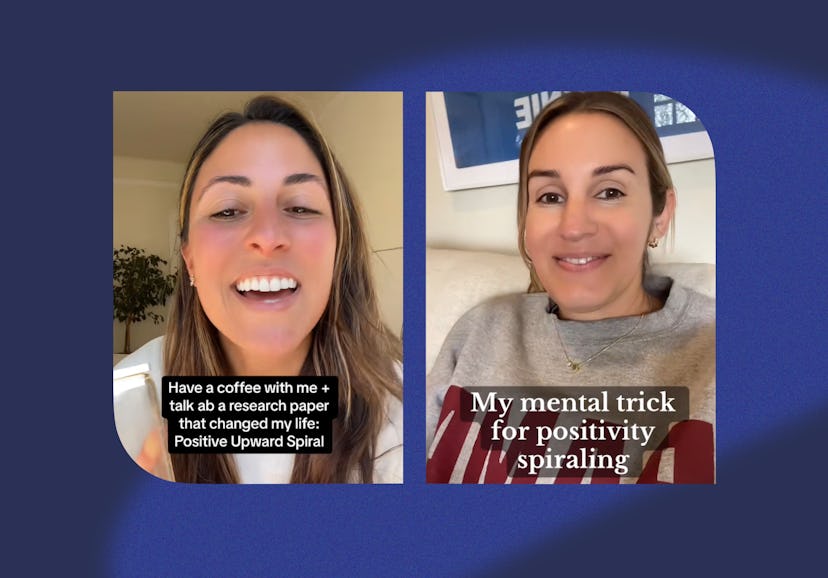Wellness
"Positive Spiraling" Is The Key To Feeling Happier Every Day
This mindset shift is going viral for a reason.

Ever get caught in a negative thought spiral? It can happen after a minor inconvenience or misunderstanding, like when you forget to buy oat milk or your friend doesn’t immediately text back. Instead of laughing it off, your brain overthinks it — I suck at everything, nobody likes me, etc. — and suddenly it feels like the world is ending.
Compare that to a positive upward spiral. This psychological concept, currently making the rounds on TikTok, is all about spinning things the opposite way. Instead of swirling down the whirlpool of anxiety and despair, you spiral upward into positivity and gratitude.
On the app, creator @katina.bajaj talked about how you can actually train your brain to go into a “positive upward spiral” more often by paying attention to good things, citing a paper that was published in American Psychologist to back it up. The researcher, Dr. Barbara Frederickson, noted that positive emotions are important not just for your well-being, but for your physical, social, and mental health, too.
In another post, creator @gsprintshoppe said this isn’t about toxic positivity or sticking your head in the sand and pretending like life is great 24/7. But by focusing on small positives — like how much she loves a morning coffee — she’s been able to help her brain feel happier on a more regular basis. Here, a therapist explains why the technique works.
“Positive Spiraling” Pros
According to Dr. Alice Mills Mai, Ph.D., LPCC-S, a licensed trauma therapist and founder and CEO of Centering Wholeness Counseling, positive upward spiraling relies on the brain’s ability to be shaped by repetition. Even if you’re a lifelong overthinker, the ongoing practice of positive spiraling can help you form new neural connections and ultimately see the world a little bit differently.
“The more we focus on positive experiences, the more our nervous system learns to orient toward safety, possibility, and hope,” she tells Bustle. “At its core, positive spiraling should be an intentional practice. It begins with noticing small glimmers of good: a warm cup of coffee, sunlight through a window, a text from a friend.”
Paths Of Positivity
Each of these moments activates new neural pathways in your brain that counterbalance your natural negativity bias, and over time, it helps strengthen those pathways so you’re naturally more optimistic and calm, says Mai. Even on your first try, you should notice a major difference in how you think and feel, especially compared to negativity, which can make you tense, panicky, and upset.
“If done intentionally, positive spiraling can serve as a mindfulness and gratitude practice to interrupt that cycle, grounding the body and signaling to the nervous system, ‘I am safe in this moment,’” she says. Once it’s a regular habit, you’ll likely notice even more benefits, like reduced stress, improved mood, a greater sense of agency, and enhanced resilience. “These upward spirals build on themselves,” she adds. “Repeated positive focus also helps the brain integrate safety and calm more quickly.”
How To Start
If this sounds great but you simply can’t picture yourself being that cheerful, Mai recommends starting small. “Notice one pleasant or comforting thing each day,” she says.
Start in the morning. Does your cat look cute? Was your smoothie perfect? As you go about your day, take note of the blue sky or how lucky you were to catch the subway, even though you thought you’d miss it. At night, acknowledge how cozy you are in bed or how your new skin care routine seems to be working like a charm.
To make it even more real, pair each moment of positivity with a physical sensation. “Feel your feet on the ground, take a slow breath, and name what’s good,” Mai says. “Practice consistently, not perfectly — even 30 seconds of mindful noticing strengthens new pathways.”
If negativity, fear, or doubt creeps back in, she recommends gently noticing it without any judgment, and then redirecting your attention to one thing that’s stable or working in your favor. “Positive spiraling can benefit anyone who struggles with overthinking, anxiety, or chronic stress, but it’s especially powerful for those recovering from trauma,” she says. “It retrains the nervous system to expect balance rather than crisis — helping resilience become a lived experience, not just an idea.”
Studies referenced:
Fredrickson, Barbara L. (2001). The Role of Positive Emotions in Positive Psychology: The Broaden-And-Build Theory of Positive Emotions. American Psychologist. doi.org/10.1037//0003-066x.56.3.218.
Source:
Dr. Alice Mills Mai, Ph.D., LPCC-S, LMHC, NCC, licensed trauma therapist, founder and CEO of Centering Wholeness Counseling